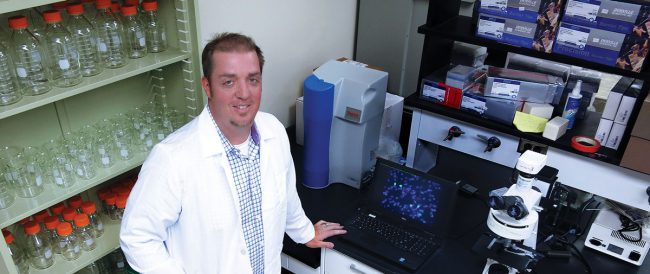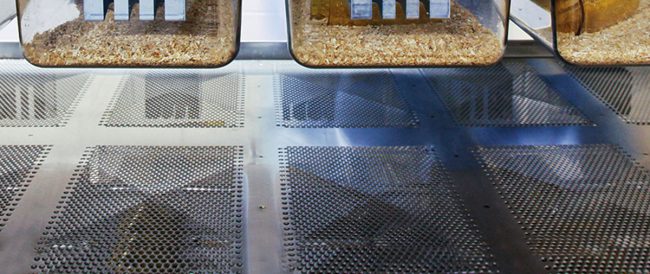 Read More
Read More
A unique toxicology residency:
MPI Research and MSU
An alarm was sounded in the early 2000s that a significant shortage of well-trained, boarded veterinary pathologists was on the horizon. Reports issued by organizations including the National Academy of Sciences, National Institutes of Health, American College of Veterinary Pathologists, and Society of Toxicologic Pathology revealed that universities were not producing enough pathologists, and those that were trained were not developing the specialized skills required by industry. »
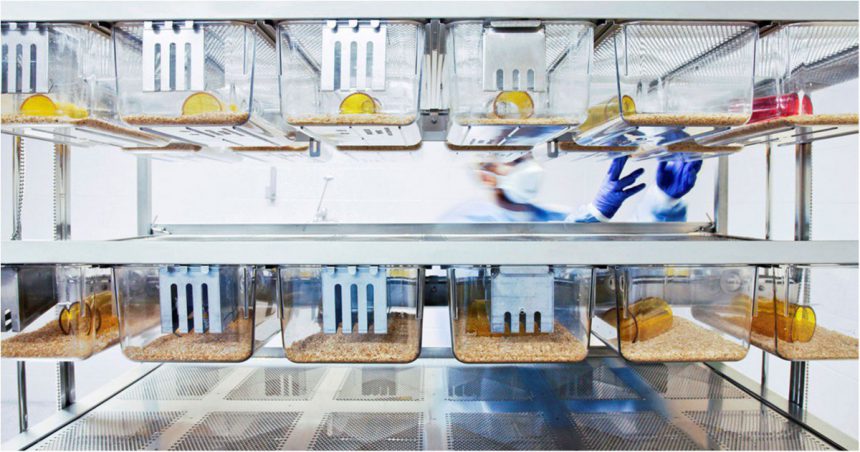
Toxicologic pathologists support health and public welfare around the world in critical roles, including research on disease processes, developing therapeutic approaches to disease, and assessing the safety of those compounds. A lack of funding for graduate students and the absence of specifically designed training programs were two primary factors for the expected shortage. Another was the rapid growth in drug research and development.
In response to the situation, in 2002 a unique program to train residents in toxicologic pathology was launched jointly by the MSU College of Veterinary Medicine and MPI Research, a contract research organization (CRO) in Mattawan, Michigan. MPI provides nonclinical and early clinical research services including biotechnology, pharmaceutical, and agricultural companies. The only similar program was formed in 2004 by the American College of Veterinary Pathologists and Society of Toxicologic Pathology and was funded by a consortium of 11 corporate sponsors and several universities. However, the resulting training programs did not have the same focused time spent immersed in the toxicologic pathology setting of a busy CRO with a dedicated training program.
The Launch of a Pathology Residency Program
“MPI Research wanted to respond directly to the causes of the shortage,” said William U. Parfet, chairman, and CEO, of MPI Research. “So we worked with MSU on a program designed to provide funding and skills, particularly in drug research and development.”
Toxicologic pathologist Dan Patrick, DVM, DACVP, was the first student to go through the program, and after passing his boards he went on to become a pathologist at MPI. Since then the pathology department has grown from 6 to 15 ACVP board-certified anatomic pathologists. In 2012 he was promoted to director of Pathology.
Patrick’s journey into the program was short and simple. He was halfway through the conventional veterinary pathology residency program in the MSU Department of Pathobiology and Diagnostic Investigation (DCPAH) when he attended a presentation in which visitors from MPI Research talked about an idea of starting a combined toxicologic pathology training program. After the presentation, the visitors encouraged any current residents who were interested in jumpstarting the program to contact them. The idea struck a chord with Patrick. Nine months later he was living in Mattawan, 90 miles southwest of East Lansing, and finishing out his residency in a very different setting.
“Being thrown into the pace of a busy CRO was a bit of a culture shock compared to MSU,” he said. “Thankfully I was allowed to help in the trailblazing of the new program. I had a solid knowledge base from my service and coursework at MSU, and MPI knew what skills were needed in a toxicologic pathologist—it was a matter of figuring out how to build a structured program that would take a resident to where they needed to be. We didn’t know what the best process was, but it worked out great.”
Now, 12 years later, the MPI Research/MSU Toxicologic Pathology training program has trained 15 toxicologic pathologists, in anatomic or clinical pathology, most of whom are now working in toxicologic pathology. The first two years of the pathology residency training are completed at the MSU Diagnostic Center for Population and Animal Health. Residents then relocate to Mattawan for 12 months of training at one of the largest single-site CROs in the world, where they are trained in good laboratory practices (GLP), laboratory animal pathology, and drug safety evaluation.
During their time in the program, residents bring fresh curiosity and passion to a laboratory culture that is already vibrant.
Since the program’s inception, it has been designed to ensure a continued strong focus on toxicologic pathology, core pathology skills, and ACVP boards training, building on the foundation established during the residents’ time at MSU.
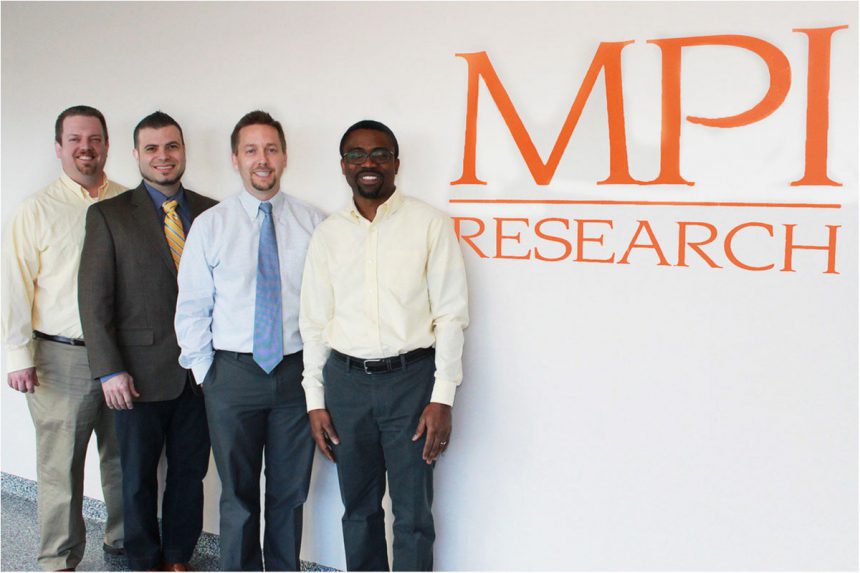
“While residents are at MSU during their first two years, they begin working with MPI Research, visiting the site and collaborating with pathologists on small research projects,” said Keith Nelson, the MPI Research residency training coordinator. “In October of their third year, residents come to MPI Research full time and are initially immersed in GLP training and necropsy, working with the MPI Research pathologists, technicians, clinical veterinarians, and other investigators,” said Nelson, who facilitates and guides the training.
This is all interspersed with slide rounds, focused discussions and training opportunities covering a range of toxicologic and general pathology subjects.
“In the DCPAH lab we want to determine cause of death and we might get 5 slides with 15 important tissues,” said Scott Fitzgerald, professor and coordinator of the residency training program in the Department: Pathobiology and Diagnostic Investigation. “Pathologists at MPI Research need to identify subtle cellular changes that may be induced by the tests being conducted. So they may look at 20 to 30 slides—we’re undertaking quite different operations.”
Over time, with increasing familiarity, they spend more time reviewing slides at the microscope, reviewing and writing up study reports. They progress to taking on non-GLP and pilot studies—typically experimental studies. These provide important exposure to laboratory animal and toxicologic pathology, as well as continuing their training in the practice of toxicologic pathology. Residents are also encouraged to take a prominent role in assessment of MPI Research diagnostic cases, education of technicians, and interactions with various scientific groups within the organization.
“The weekly slide rounds are a great place for students,” said Patrick. “We have 17 board certified veterinary pathologists—15 anatomic and 2 clinical––and the teams can collaborate and show challenging cases to each other. Students see a lot of interesting histopathology in laboratory animals due to a wide variety of different test articles.
And we debate and work out the pathogenesis and any further investigative techniques needed.”
Patrick said the program is structured to support residents in board certification and enter the industrial job market well prepared—and the fact that MPI Research is one of North America’s largest and rapidly growing CROs is definitely a bonus.
Dedicated toxicologic pathology training
Traditional diagnostic training residencies provide no dedicated toxicologic pathology training. It is the focused toxicologic pathology training that makes this residency unique—and attractive to some of the most outstanding graduates in the field.
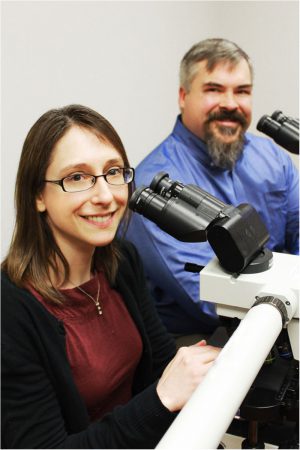
“This program is not only unique in the United States, but I believe it is the only residency of its kind in the world,” said Chidozie Amuzie, who earned his DVM from the University of Nigeria before deciding on the MSU program.
Amuzie earned a double major PhD in Comparative Medicine and Integrative Biology (CMIB) and Environmental and Integrative Toxicological Sciences.
“I was trained well at MSU, and had the benefit of teachers and mentors like Drs. Vilma Yuzbasiyan-Gurkan, James Pestka, Jack Harkema, Robert Roth, Patti Ganey, and many others. In addition to science, they emphasized the importance of research integrity and productivity, as well as collegiality,” said Amuzie.
Toward the end of his PhD program, Amuzie decided he wanted additional pathology training. Following conversations with Drs. Jack Harkema and Dalen Agnew, he decided the MPI Research/MSU residency could leverage his skills and interests in toxicology.
At MPI Research, Amuzie found the number of species, breadth of studies, and the global scientific culture to be impressive. The fast pace, he said, is tremendous for someone early in their career. One surprise for Amuzie at MPI Research was the level of teamwork.
“There was a vested interest in training and mentorship,” Amuzie said. “I didn’t expect the deep sense of teamwork that I saw, but it really helped my development.”
Now a pathologist at MPI Research, Amuzie continues to experience that collegiality.
“The teamwork here is extraordinary. There’s a sense that everything we do reflects on every person at MPI Research—it extends across groups. Last year, a test article that my colleagues worked on became the front line treatment for a major human disease. Everyone is proud of such accomplishments.”
Researchers at universities, including those at the MSU College of Veterinary Medicine, generate world-changing knowledge and develop solutions for some of the great challenges to animal, human, and environmental health. Amuzie found a level of curiosity and innovation in industry similar to that in universities. For him, the exciting thing about working at the safety assessment phase in drug development is the proximity to making real changes in people’s lives.
“The results of my work here are not far from making a direct impact on the science that helps human health,” Amuzie said. “This is very impactful for people who may be cured or given more time—that we’re so close to the point of getting that compound to humans. That therapy might be for a dad who’s been hanging on so that he can see his daughter get married. That’s very significant to me.”
“The residency program has allowed us to train some of the finest pathologists in the field.” — William U. Parfet
A life-changing profession
“I can’t think of a higher calling,” says Mike Boyle, who completed the residency in 2009. “There’s nothing more fulfilling than discovering and developing medicines for grievous human diseases, and this work requires advanced training and specific skills.”
Boyle is now a pathologist and project lead in the Department of Comparative Biology and Safety Sciences at Amgen, a biotechnology company in Thousand Oaks, California. He credits the residency program with his success.
“Industry is looking for someone who trained in a formal toxicological environment—a very specific person that has the experience that only industry can offer. To my knowledge MPI Research is the only program that does that—more than pharmaceutical development—where a trainee does nothing but pharmacological toxicology.”
They have experience in special pathology studies and pilot studies and have prepared and presented a toxicologic pathology-related presentation at MPI Research and Michigan State University. They are also expected to complete at least one toxicologic pathology-related prospective or retrospective research project that culminates in publication or presentation at a national meeting.
“I can’t exaggerate the degree to which someone with this training stands out,” Boyle said. “At one meeting there were four trainees and we had been given special placement right in front of the door for our posters. The other trainees were super smart but didn’t have toxicologic pathology training. People walking in the door were interested in me specifically because of my training at MPI Research. It made a real difference.”
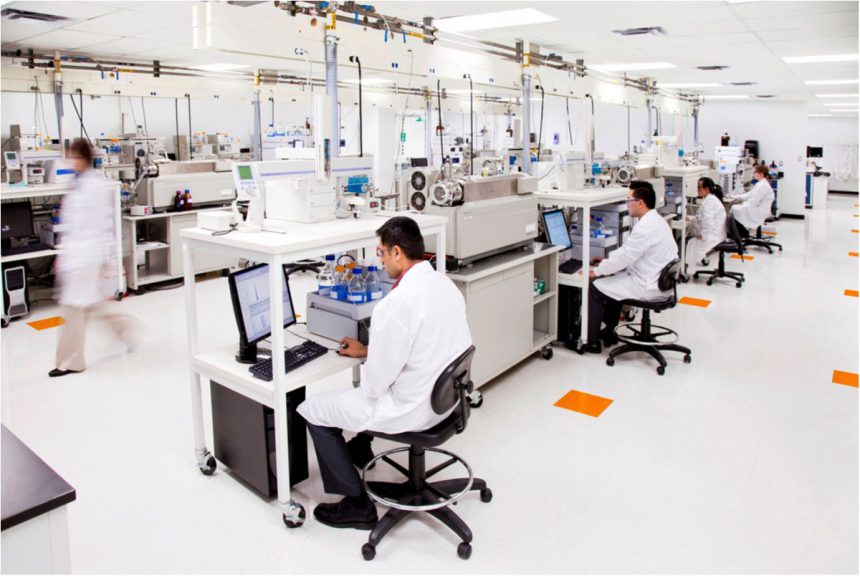
The program provides training in skills and experience working in a structured, fast-paced environment, as well as facilitating connections for residents to pathologists around the country.
“I wanted to be involved from discovery to development to study and post market study,” Boyle said. “For that I had to go into a large pharmaceutical company, which required a PhD.”
Boyle conducted his PhD research with David Malarkey, DVM, PhD, DACVP, in the National Toxicology Program (NTP) and was a fellow at the National Institute of Environmental Health Sciences (NIEHS).
“I was fortunate to get recruited to Amgen and this in no small way had to do with networking. I can’t overstate the importance of this. Because of my connections through MPI Research, the Amgen director came out and saw me at a conference.”
As to whether a shortage of pathologists continues, Boyle said “yes” and “no.” There are pathologists, but they are being trained primarily in diagnostic labs. It is also important that veterinary students are exposed to the possibilities of pathology.
“Pathology is not a career that a lot of veterinary students look at,” Boyle said. “But I cannot imagine a field that more fully upholds the Veterinarian’s Oath. We use our scientific knowledge and skills for the benefit of society, we promote public health, we advance medical knowledge, and we protect animal health and relieve animal suffering—this is an issue we do not take lightly at all—everything we do is based on the Three Rs (Replacement, Reduction and Refinement: a set of principles that guides the ethical evaluation of animal use). Advancing human health is what I do every day.”
Boyle did not plan to study pathology. When he entered his clinical years, his plan was to pursue emergency medicine. But a gap in his clinical schedule led him to a rotation that brought students to places other than clinical practices, including the FDA, CDC, slaughter houses, pharmaceutical companies, and an air force base in Ohio.
“One of those places was MPI Research,” Boyle said. “I met Dan Patrick, who told me about MPI and all that they do to ensure drugs are safe before human trials. I changed course.”
Illuminating the breadth of veterinary medicine
Students are not always aware of the opportunities available in toxicological pathology.
To introduce the breadth of career possibilities available to them, Dan Patrick and Keith Nelson visit Fitzgerald’s rotating case-based seminar once a semester to show slides.
For 13 years, MPI Research has been committed providing the training required by the industry requires—whether the residents work in Michigan or elsewhere in the world. They also have a pipeline of young, up-and-coming, well-trained people that they can fit right into their program as they need them. They’ve hired 5 of the 11 who have gone through the program.
Most graduates of residency programs think about pursuing positions in academia or government diagnostic laboratories. Fitzgerald explained that students don’t know as much about careers with pharmaceutical companies or CROs, but that roughly a third of toxicological pathology positions are in this arena.
“Alumni of the program now have careers around the world, and we are pleased to have a number of these pathologists here with us at MPI Research,” said Parfet. “The residency program allowed us to train some of the finest pathologists in the field, to help serve our mission of advancing global healthcare”.
The exceptional program has trained exceptional toxicological pathologists, men and women equipped with the skills to advance our ability to tackle some of the world’s existing and emerging devastating diseases.


